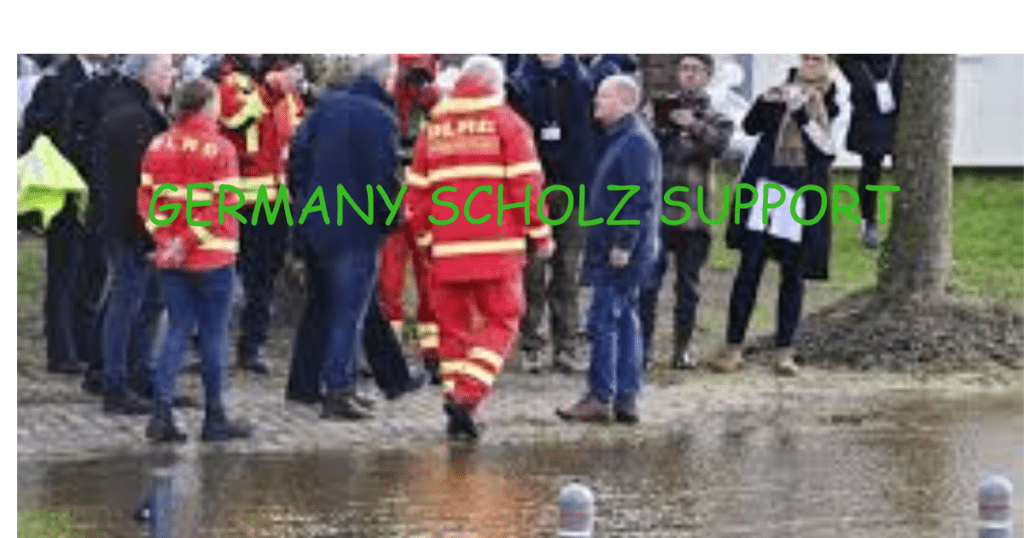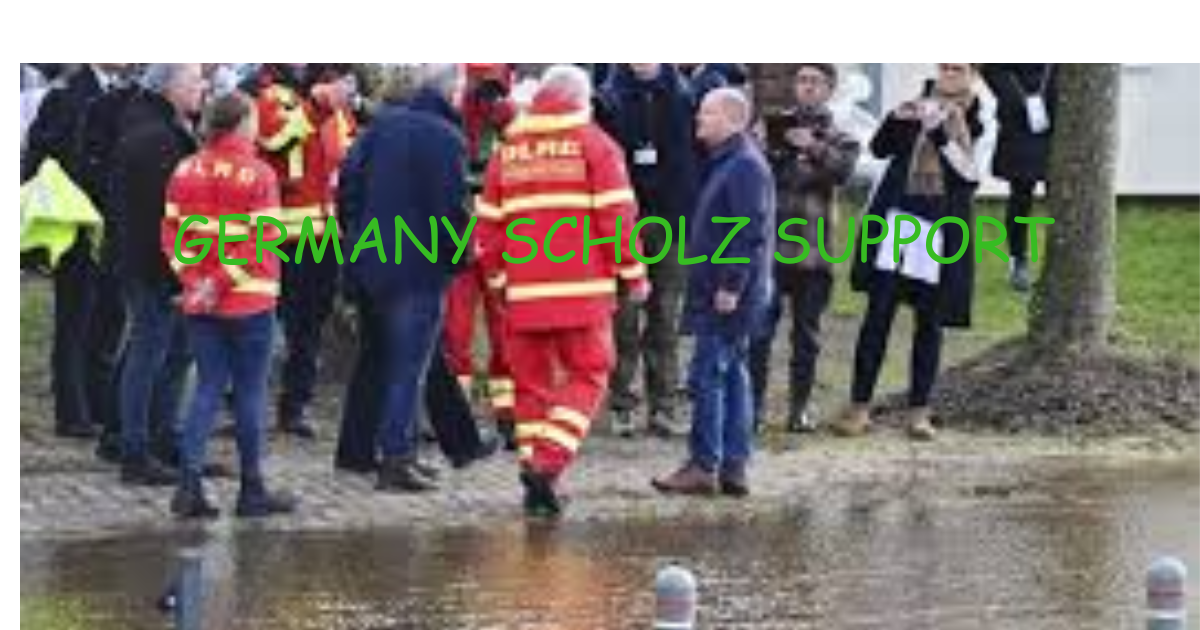In the heart of Europe, when rivers overflow their banks and towns are swallowed by the unrelenting surge of floodwaters, it is not just the physical landscape that changes—it is the human spirit that is tested. Germany, a nation deeply familiar with both the power and the fury of nature, once again finds itself in the midst of this profound test. As heavy rainfall and catastrophic flooding swept through central Europe, Chancellor Olaf Scholz extended his hand of solidarity and support to the neighbours grappling with the devastation.




An Unforgiving Force: The Flooding Crisis in Central Europe
The recent floods have left a scar on the land and the lives of those affected. Swollen rivers have surged beyond their banks, turning villages into islands and farmlands into lakes. Homes, businesses, and livelihoods have been submerged under the weight of the unrelenting waters. Germany, too, has felt the sting of this natural disaster, but it is the spirit of cooperation and the strength of unity that has risen above the waters.
In the face of such destruction, Chancellor Scholz has not merely offered condolences; he has made it clear that Germany stands ready to assist its neighbours in their time of need. Scholz’s offer is more than a gesture of goodwill; it is a reflection of the deeply rooted belief in European unity and the shared responsibility to rebuild what nature has torn apart.
Germany’s Response: Offering Aid Beyond Borders
The flooding has hit nations such as Austria, Belgium, and Luxembourg hard, with infrastructure destroyed and communities left in disarray. In response, Chancellor Scholz has vowed to provide both financial and logistical support to help these countries recover from the devastation. He understands that in times of crisis, borders become irrelevant, and it is the collective strength of nations that can bring about healing.
Germany’s robust emergency response infrastructure has been mobilized to support its neighbours, with rescue teams, engineers, and financial resources being directed to the areas hardest hit. In the words of Scholz himself, “The floods know no borders, and neither should our compassion.”
A United Europe in Crisis
The floods have tested Europe’s ability to respond to natural disasters, but they have also shown the resilience of a continent bound by shared values. Chancellor Scholz has emphasized that solidarity must remain the cornerstone of Europe’s response to such disasters. In his view, the interconnectedness of European nations is not just an economic or political reality, but a moral imperative that calls for cooperation in times of need.
Scholz’s leadership has been marked by his commitment to forging stronger ties with Europe’s neighbours, and his response to the flooding crisis is a testament to this philosophy. By extending aid, resources, and expertise, Germany is not only helping its neighbours rebuild but also reinforcing the idea that Europe stands stronger when united.
The Economic and Human Toll of the Flooding
The economic damage caused by the floods is staggering. Across Austria, Belgium, Luxembourg, and Germany, the cost of rebuilding infrastructure, homes, and businesses is expected to run into the billions. However, the true cost of such a disaster cannot be measured in euros alone. Families have lost their homes, their sense of security, and in some cases, their loved ones.
Scholz’s commitment to financial support extends beyond immediate relief. He has promised long-term assistance to help rebuild the economies of the affected regions, emphasizing that recovery is not a sprint, but a marathon. Germany’s economic strength will be a vital resource in helping neighbouring countries navigate the long road to recovery.
Rebuilding with Resilience: Climate Change and Future Preparedness
The floods have sparked a renewed conversation about climate change and the importance of preparing for future natural disasters. As a leader on the global stage, Chancellor Scholz has been vocal about the need for robust climate policies that will mitigate the effects of such extreme weather events. In his address to the European community, Scholz stressed that these floods serve as a stark reminder of the urgent need to address climate change.
The Chancellor has called for a coordinated European effort to invest in climate resilience, ensuring that cities and rural areas are better prepared to withstand the forces of nature. Scholz’s vision for the future is one in which sustainability and preparedness are at the forefront of Europe’s collective strategy. The floods may have washed away homes, but they have also built a stronger resolve to confront the climate crisis head-on.
A Humanitarian Effort: The Role of Germany’s Rescue Teams
One of the most immediate responses to the floods has been the deployment of Germany’s renowned emergency rescue teams. These teams, equipped with cutting-edge technology and unmatched expertise, have been sent to the affected regions to assist in rescue operations, provide medical aid, and help rebuild vital infrastructure.
Germany’s Federal Agency for Technical Relief (THW) has been instrumental in these efforts. With engineers, medical personnel, and disaster management experts working tirelessly, the agency has been at the forefront of the humanitarian response. Chancellor Scholz has praised the dedication of these teams, highlighting their compassion and courage as they navigate treacherous conditions to save lives and restore a sense of normalcy.
Chancellor Scholz’s Leadership in Times of Crisis
Scholz’s response to the flooding crisis has been defined by decisive action and compassionate leadership. In his public addresses, he has emphasized the importance of standing together, not just as individual nations but as a united Europe. His leadership has instilled a sense of hope in the people affected by the floods, reminding them that they are not alone in their struggles.
As Germany offers aid to its neighbours, Scholz’s message is clear: “We are in this together.” His leadership during this crisis has reinforced the idea that when disaster strikes, the strength of a nation—and indeed, a continent—lies in its willingness to support one another.
Conclusion: A Future Built on Unity and Resilience
The flooding that has ravaged central Europe serves as a stark reminder of both the power of nature and the strength of human resolve. Under the leadership of Chancellor Olaf Scholz, Germany has shown that compassion, solidarity, and resilience are the keys to overcoming even the most devastating of challenges.
As the waters recede and the rebuilding process begins, the people of Austria, Belgium, Luxembourg, and Germany will emerge stronger. Scholz’s promise of support is not just a lifeline for the present—it is a foundation upon which the future can be built, a future defined by unity, resilience, and a shared determination to face whatever comes next.
